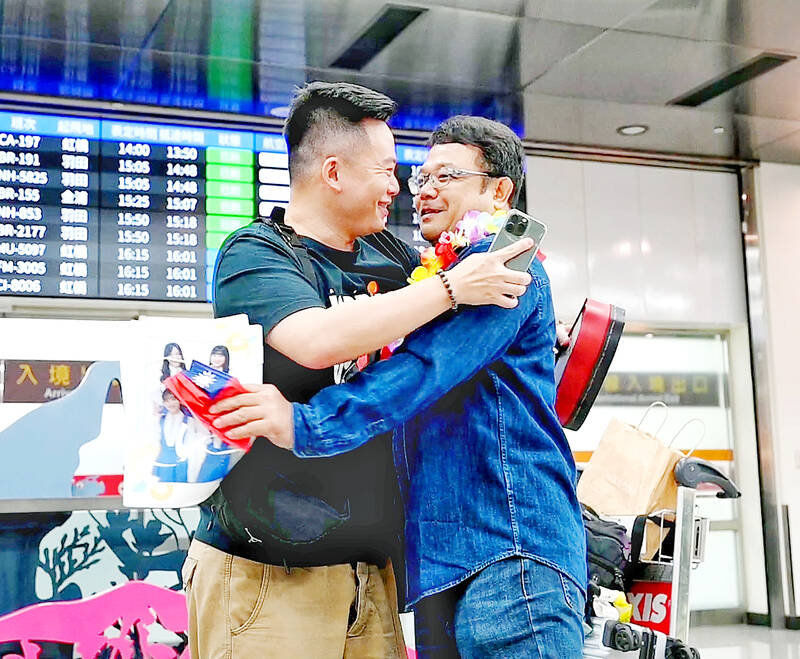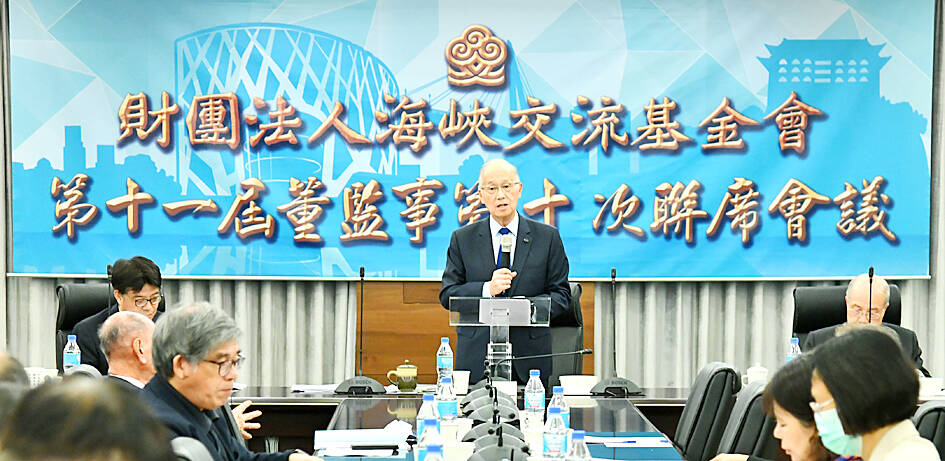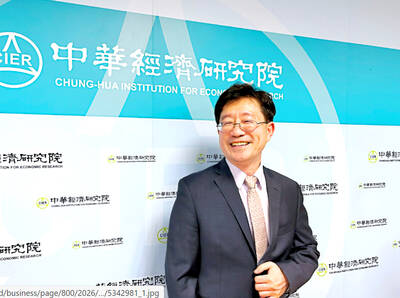Morrison Lee (李孟居), who was imprisoned in China for 22 months on spying charges, arrived in Taiwan yesterday.
Lee knelt to kiss the ground twice upon his arrival at Taipei International Airport (Songshan airport), saying that he was overcome with joy to return after 1,475 days.
“This is the land of freedom,” he said. “I will never go to China again.”

Photo: Fang Pin-chao, Taipei Times
“I will use my experience to tell Taiwanese: If you go to China, Hong Kong or Macau, you really must be very careful,” he told reporters.
Lee was an unpaid adviser to Pingtung County’s Fangliao Township (枋寮) when he was arrested in 2019 while traveling from Hong Kong to Shenzhen for business.
He was convicted on espionage charges and handed a 22-month sentence. After completing the sentence in 2021, the Chinese government prohibited him from leaving China for two more years.

Photo courtesy of the Straits Exchange Foundation
He was allowed to leave in July, but was not allowed on a flight to Taiwan, so he flew to Japan, where he stayed until yesterday.
On Friday, Straits Exchange Foundation Chairman David Lee (李大維) said that China’s Counter-Espionage Law is not conducive to stable cross-strait exchanges.
Exchange programs and reciprocal visits have restarted with the easing of COVID-19 restrictions and the Mainland Affairs Council (MAC) has announced measures to open up to Chinese tourists.
“Tourism and people-to-people interactions are the best ways to bolster mutual understanding between the two sides, but China on July 1 promulgated a revised Counter-Espionage Law, which has new provisions that substantially expand the scope of activities that Chinese authorities consider espionage,” David Lee said.
Media have reported cases of Taiwanese being confined in China or facing “unfriendly treatment,” he said. “The Chinese government should know that such incidents are not conducive to cross-strait peace and stability.”
“Taiwanese should exercise caution in their speech and action while in China to avoid breaching its laws,” he added.
China is facing an economic crisis, with Chinese property developers defaulting on debts among the financial woes, while the youth unemployment rate has been climbing for six months, reaching 21.3 percent in June, David Lee said.
Beijing in July stopped releasing youth unemployment data, so the actual situation might be even worse, he said.
Separately, a national security official warned Taiwanese about traveling to Chongqing, which on Friday promulgated a Counter-Espionage Regulation.
It is the first local law that connects to the central government’s Counter-Espionage Law, giving the megacity the legislative instrument to fight spying by Chinese and foreigners, said the official, who declined to be named.
The regulations allow Chinese authorities to “make arbitrary arrests,” creating a “minefield” for Taiwanese, the official said.
The MAC last week issued a warning to Taiwanese, listing things they should refrain from saying in China, as they can be interpreted as “attempting to obtain state secrets” or “spying activities,” the official said.
The decision to stop releasing data on youth unemployment, as well as real-estate, foreign direct investment, stock market trading, COVID-19 deaths, unfavorable information about Chinese academia, and personal information about Chinese politicians are topics to avoid, the official said.

The Grand Hotel Taipei on Saturday confirmed that its information system had been illegally accessed and expressed its deepest apologies for the concern it has caused its customers, adding that the issue is being investigated by the Ministry of Justice Investigation Bureau. The hotel said that on Tuesday last week, it had discovered an external illegal intrusion into its information system. An initial digital forensic investigation confirmed that parts of the system had been accessed, it said, adding that the possibility that some customer data were stolen and leaked could not be ruled out. The actual scope and content of the affected data

DO THEY BITE IT? Cats have better memories than people might think, but their motivation is based entirely around the chance of getting fed Cats can remember the identity of the people who fed them the day before, Taipei-based veterinarians said on Friday, debunking a popular myth that cats have a short memory. If a stray does not recognize the person who fed them the previous day, it is likely because they are not carrying food and the cat has no reason to recognize them, said Wu Chou Animal Hospital head Chen Chen-huan (陳震寰). “When cats come to a human bearing food, it is coming for the food, not the person,” he said. “The food is the key.” Since the cat’s attention is on the food, it

People hold incense and pray with offerings in front of Taipei’s Kuanghwa Market yesterday. The fifth day of the Lunar New Year is traditionally about welcoming the God of Wealth, during which companies and shops set off firecrackers to celebrate their reopening and pray for good business in the new year.

Taiwan must act to preempt potential Section 301 investigations as US President Donald Trump moves to a new tariff strategy, following a US Supreme Court ruling that voided tariff measures, an academic said yesterday. Countries running the largest trade surpluses with the US face a growing likelihood of Section 301 investigations, Chung-Hua Institution for Economic Research president Lien Hsien-ming (連賢明) said. Section 301 refers to a provision of the Trade Act of 1974 that allows Washington to impose retaliatory tariffs over perceived unfair trade practices, including the running of large trade surpluses. Because Taiwan has become the fourth-largest source of the US’ trade